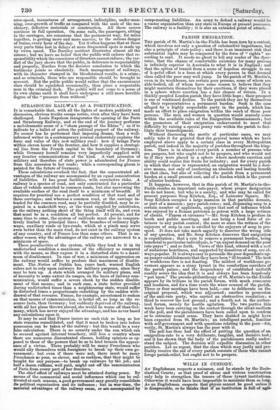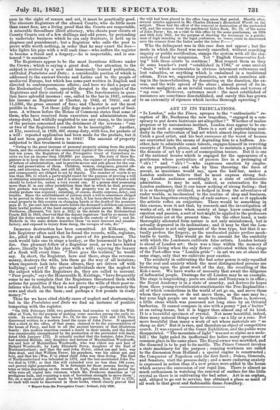WILLS IN CUSTODY.
AN Englishman respects a nuisance, and he stands by the Eccle- siastical Courts ; so that proof of abuse and vicious construction only help to strengthen the tenure of those tyrant institutions. Otherwise it would have been impossible to maintain them so long. As an Englishman suspects that physic cannot be good unless it is disagreeable, so he thinks that if an institution is full of ugli-
ness in the sight of reason and art, it must be practically good. The sinecure Registrars of the abused Courts, who do little more than exact fees, are a living proof that the Courts are respectable. A miserable threadbare illicit attorney, who cheats poor clients at County Courts out of a few shillings and odd pence, by pretending to undertake business which he can only frustrate, is held up to disgrace and punishment; but a Registrar who calls -the poor to prove wills worth nothing, in order that he may exact the fees— who lights his pipe with a will each time—who suffers the register to become a fraud and a forgery,—he is respectable, and is sen- tenced" to continue."
The Registrars appear to be the most licentious fellows under the Crown ; which is saying a great deal. Our attention to the subject is revived by a new and immensely learned publication, entituled Postulates and Data ; a considerable portion of which is addressed to the ancient Greeks and Latins and to the people of mediaeval Europe, but which has some part written in English and directed to contemporaneous affairs; and here we find a paper on the Ecclesiastical Courts, specially devoted to the subject of the Registrars and their custody of wills. The functionaries in ques- tion have splendid incomes : one, called to the harm 1837, returns his income as Registrar at Chester, in 1812, at 7041/. out of 11,5301., the gross amount of fees; and Chester is not the most prolific in fees. Yet these jolly dogs make a perfect sport of busi- ness. A witness before the House of Commons states that some of them, who have received from executors and administrators the stamp-duty, had wilfully neglected to use any stamp, to the injury of the persons concerned and the detriment of the revenue : "one or two of the Registrars I consider to be incorrigible." Another, at Ely, received, in 1829, 60/. stamp-duty, with fees, for probate of a 'will: repeated application had been made for the probate, but it had not been granted down to 1842! The amount of property subjected to this treatment is immense.
"Owing to the great increase of personal property arising from the publio funds, and the extension of the commercial capital of the country during the last ten years, the Registrars of the Prerogative Court of Canterbury re- ceive no less an income than 150,000/. per annum. The duty of these Re- gistrars is to keep the records of their courts, the register of probates of of letters of administration, and to provide secure and safe places for the cus- tody and preservation of them. Children, women, clergymen, general offi- cers, and attornies, have filled, and still fill, in different dioceses, this office, and consequently are obliged to act by deputy. The number of courts is no less than 386, to which a party might resort for the purpose of proving a will or obtaining administration; and it is almost impossible to know where a will should be looked for, unless a very recent one. If a person died possessing more than Si. in any other jurisdiction than that in which he died, preroga- tive probate was required. Again, if the property was in two provinces, double probate was required; entailing, of course, double expense, delay, and trouble. Since the establishment of railway stock a will is sometimes obliged to be proved in three or four courts; in fact, it has been shown that the per- sonal property in this country on changing hands at the death of the possessor pays 41. 73. per cent into these courts before the deceased's children can receive their lawful portion of the hard earnings of a provident parent. Mr. Edward Protheroe, (Hansard, Vol. lavi. p. 313,) in the debate on the Ecclesiastical Courts Bill in 1843, observed that the deputy registrars had by no means ful- filled the duties assigned to them as regards the custody of wills'; and Dr. Nicholls in the same debate describes them as most insecure and unsatis-
factory, and exposed to injury-from damp, the ravages of rats, "
Immense destruction has been committed. At Kilkenny, the late Registrar often said that he found the records, wills, registers, &c., piled in old hampers, in the garret of his predecessor. The cook would take one to singe a turkey, or the housemaid to light a fire. One pleasant fellow of a Registrar used, as we have hinted above, literally to light his pipe with a will ; enjoying the luxury ef a fresh will every time. "Here goes the testator," he would say. In short, the Registrar, here and there, stops the revenue- money, destroys the wills, lets them go the way of all testators ; when inquirers look into these abuses, they are driven off with bullying; and yet if the private individuals show the neglect to the subject which the Registrars do, they are called to account. "Poor people," says the Honourable R. Keatinge, "have frequently come to me to complain that the Registrars threatened them with actions for penalties if they do not prove the wills of their poor re- lations who died, having but a small property—perhaps merely the cows and stock on the farm; and perhaps a few pounds in ready money." Thus far we have cited chiefly cases of neglect and shortcoming; but in the Postulates and Data we find an instance of positive tampering with the register.
"On 19th February 1850, two gentlemen had occasion to visit the Will- office at York, for the purpose of making some searches among the early re- cords. In searching the index No. 76, for the years 1721 and 1722, they discovered written in a modern hand the name of John Paver. It appeared that a clerk in the office, of that name, claimed to be the, representative of the house of Percy, and heir to all the ancient baronies of that illustrious family : this modern insertion caused a doubt in their minds, and the doubt was considerably strengthened by the production of the pretended will itself dated 15th January 1721. It actually recited that the testator, John Paver, had married Millian, only daughter and heiress of Maximillian Woodrooife, son and heir of Maximilian Woodrooffe who was eldest son and heir of Richard Woodrooffe, by Lady Elizabeth' Percy, daughter of the Earl of Northumberland ; and that the said John Paver, eldest son and heir, was then dead, and that William Paver, his grandson, was his eldest son and heir, and that his (Wm. P.'s) eldest child John was then living. The Earl of Northumberland was beheaded in 1572, and the last-mentioned John Pa- ver died in 1760; so that this will extended over no less than 188 years, and proved eight generations. It is fortunate for those persons having es- tates or titles depending on the records at York, that about this period the wills were all copied into volumes, which Mr. Protheroe describes as of prodigious bulk, and requiring a man of herculean strength to move them' ; for, on a most careful search made by both gentlemen, from 1719 to 1731, no such will could be discovered in those books, which clearly proved that 'Report tram the Prerogative Court: Ireland, July 1850. the will had been placed in the office long since that period. Shortly after, several articles appeared in Mr. Charles Dickens's Household Words on the subject. These had the effect of the removal or destruction of the pretended will, and the erasure froth the parchment Index Book, No. 76, of the name of John Paver ; for, on a visit to this office by the same gentleman, on 19th and 24th July 1851, for the purpose of showing the document to a gentle- man of high standing in the legal profession, no traces could be discovered save the erasure from the Index under the letter P—."
Who the delinquent was in this ease does not appear ; but the mode in which the fraud was merely cancelled, without searching inquiry or public rectification, stamps the system with all the cha- racters of fraud by misprision. Yet "English Conservative feel- ing" bids these courts to continue ! Men respect them as they do some knacker's yard "established in 1703; or some ancient " drain " which accumulates in obvious interment rottenness and lost valuables, or anything which is embalmed in a traditional odium. Even we sagacious journalists, now catch ourselves aid- ing in the immortalization, by descanting on the duration, the ex- cess, and the wide spread' of the abuse ; almost proud of its in- veterate malignity, as an invalid vaunts the tedium and terrors of "my case." However, extremes meet : the most established of nuisances are sometimes disestablished, and surely, this has grown to an extremity of ripeness which invites thorough uprooting



























 Previous page
Previous page